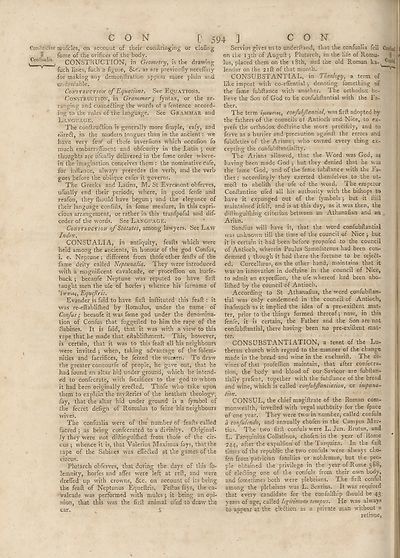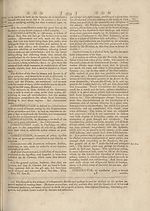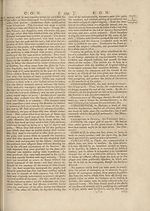Encyclopaedia Britannica, or, a Dictionary of arts, sciences, and miscellaneous literature : enlarged and improved. Illustrated with nearly six hundred engravings > Volume 6, CHI-Crystallization
(640) Page 594
Download files
Complete book:
Individual page:
Thumbnail gallery: Grid view | List view

C O N [• 594 ] CON
Conftri&or nnufcles, on account of their coniiringing or doling
II fome of the orifices of the body.
,Con{-iaha-, CONSTRUCTION, in Geometry, is the drawing
fuch lines, fuch a figure, &c. as are previcufiy necefiary
for making any demonftration appear more plain aiid
undeniable.
Construction of Equations. See Equations.
Construction, in Grammar; fyntax, or the ar¬
ranging and connecting the words of a fentence accord-
ing to the rules of the language. See Grammar and
Language.
The conftruftion is generally more Ample, eafy, and
direft, in the modern tongues than in the ancient: we
have very few' of thole inverfions which occafion fo
much embarraffment and obfeurity in the Latin 5 our
thoughts are ufuaily delivered in the fame order where¬
in the Imagination conceives them : the nominative (tafe,
for inftance, always precedes the verb, and the verb
goes before the oblique cates it governs.
The Greeks and Latins, M. St Evresnont obferves,
ufually end their periods, where, in good fenle and
reafon, they (liould have begun j and the elegance of
their language confiils, in fome meafure, in this capri¬
cious arrangement, or rather in this tranfpofal and dif-
order of the words. See Language.
Construction of Statutes, among lawyers. See Law
Index.
CONSUALIA, in antiquity, feafts which were
held among the ancients, in honour of the god Confus,
i. e. Neptune ; different from thofe other feafls of the
fame deity called Neptunalia. They were introduced
with a magnificent cavalcade, or proceffion on horfe-
back ; becaufe Neptune way reputed to have firtf
taught men the ufe of horfes j whence his furname of
'IsTTruis, Equefris.
Evander is faid to have firft inftituted this feaft : it
was re-eftablitlied by Romulus, under the name of
Confus; becaufe it was fome god under the denomina¬
tion of Confus that fuggefled to him the rape of the
Sabines. It is faid, that it was with a view to this
rape that he made that eftablifhment. This, however,
is certain, that it was to this feaft all his neighbours
were invited ; when, taking advantage of the foiem-
nities and facrifices, he feized the women. To draw
the greater concoune of people, he gave out, that he
had found an altar hid under ground, which he intend¬
ed to confecrate, with facrifices to the god to whom
it had been originally eredfed. Thofe who take upon
them to explain the myfteries of the heathen theology,
fay, that the altar hid under ground is a fymbol of
the fecret defign of Romulus to feize his neighbours
wives.
The confualia were of the number of feafts called
facred ; as being confecrated to a divinity. Original¬
ly they were not dlftinguiftied from thofe of the cir¬
cus ; whence it is, that Valerius Maximus fays, that the
rape of the Sabines was effe&ed at the games of the
circus.
Plutarch obferves, that during the days of this So¬
lemnity, horfes and afles were left at reft, and were
drafted up with crowns, &c. on account of its being
the feaft of Neptunus Equeftris. Feftus fays, the ca¬
valcade was performed with mules; it being an opi¬
nion, that this was the firft animal ufed to draw the
car. 5.
Servius gives us to underhand, that the confualia fell Confe;
on the 13th of Auguft ; Plutarch, in the life of Romu- || >
lus, placed them on the 18th, and the old Roman ka-, j
lendar on the 21ft of that month.
CGNSUBSTANTIAL, in Theology, a term of
like import with co-eftenlial j denoting fomething of
the fame fubftance with another. The orthodox be¬
lieve the Son of God to be confubftantial with the Fa¬
ther.
The term eftouo-us, cotfuffantial, was firft adopted by
the fathers of the councils of Antioch and Nice, to ex-
prefs the orthodox doftrine the more precifely, and to
ferVe as a barrier and precaution againft the errors and
fubtlcties of the Arians •, who owned every thing ex¬
cepting the confubftantiality.
The Arians allowed, that the Word was God, as
having been made God j but they denied that he was
the lame God, and of the fame iubftance with the Fa¬
ther : accordingly they exerted tbemi’elves to the ut-
moft to abolilh the ufe of the word. The emperor
Conftantine ufed all his authority with the bilhops to
have it expunged out of the lymbols; but it ftiil
maintained itfelf, and is at this day, as it was then, the
diftinguilhing ciiterion between an Athanafian and an
Arian.
Sandius will have it, that the word confubftantial
was unknown till the lime of the council of Nice j but
it is certain it had been before propofed to the council
of Antioch, wherein Paulus Samofatenus had been con¬
demned j though it had there the fortune to be vejefi-
ed. Curcellteus, on the other hand, maintains that it
was an innovation in doftrine in the council of Nice,
to admit nn exprefilon, the ufe whereof had been abo-
lilhed by the council of Antioch.
According to St Athanafius, the word confubftan-
tial was only condemned in the council of Antioch,
inafmuch as it implied the idea of a pre-exiftent mat¬
ter, prior to the things formed thereof; now, in this
fehfe, it is certain, the Father and the Son are not
confubftantial, there having been no pre-exiftent mat¬
ter.
CONSUBSTANTIATION, a tenet of the Lu¬
theran church with regard to the manner of the change
made in the bread and wine in the eucharift. The di¬
vines of that profefhon maintain, that after confecra-
tion, the body and blood of our Saviour are fubftan-
tially prefent, together with the fubftance of the bread
and wine, which is called confubfantiation, cr irnpana-
tion.
CONSUL, the chief magiftraie of the Roman com¬
monwealth, invefted with regal authority for the fpace
of one year. They were two in number, called confuls
a corfulendo, and annually chofen in the Campus Mav-
tius. The two firft confuls were L. Jun. Brutus, and
L. Tarquinius Collatinus, chofen in the year of Rome
244, after the expulfion of the Tarquins. In the firft
times of the republic the two confuls were always cho¬
fen from patrician families or nobleman, but the peo¬
ple obtained the privilege in the year of Rome 388,
of elefling one of the canfuls from their own body,
and fometimes both were plebeians. The firft; conful
among the plebeians was L. Sextius. It was required
that every candidate for the confulfhip fhould be 43
years of age, called legitimum tempus. He was always
to appear at the election as a private man without a
retinpe,
Conftri&or nnufcles, on account of their coniiringing or doling
II fome of the orifices of the body.
,Con{-iaha-, CONSTRUCTION, in Geometry, is the drawing
fuch lines, fuch a figure, &c. as are previcufiy necefiary
for making any demonftration appear more plain aiid
undeniable.
Construction of Equations. See Equations.
Construction, in Grammar; fyntax, or the ar¬
ranging and connecting the words of a fentence accord-
ing to the rules of the language. See Grammar and
Language.
The conftruftion is generally more Ample, eafy, and
direft, in the modern tongues than in the ancient: we
have very few' of thole inverfions which occafion fo
much embarraffment and obfeurity in the Latin 5 our
thoughts are ufuaily delivered in the fame order where¬
in the Imagination conceives them : the nominative (tafe,
for inftance, always precedes the verb, and the verb
goes before the oblique cates it governs.
The Greeks and Latins, M. St Evresnont obferves,
ufually end their periods, where, in good fenle and
reafon, they (liould have begun j and the elegance of
their language confiils, in fome meafure, in this capri¬
cious arrangement, or rather in this tranfpofal and dif-
order of the words. See Language.
Construction of Statutes, among lawyers. See Law
Index.
CONSUALIA, in antiquity, feafts which were
held among the ancients, in honour of the god Confus,
i. e. Neptune ; different from thofe other feafls of the
fame deity called Neptunalia. They were introduced
with a magnificent cavalcade, or proceffion on horfe-
back ; becaufe Neptune way reputed to have firtf
taught men the ufe of horfes j whence his furname of
'IsTTruis, Equefris.
Evander is faid to have firft inftituted this feaft : it
was re-eftablitlied by Romulus, under the name of
Confus; becaufe it was fome god under the denomina¬
tion of Confus that fuggefled to him the rape of the
Sabines. It is faid, that it was with a view to this
rape that he made that eftablifhment. This, however,
is certain, that it was to this feaft all his neighbours
were invited ; when, taking advantage of the foiem-
nities and facrifices, he feized the women. To draw
the greater concoune of people, he gave out, that he
had found an altar hid under ground, which he intend¬
ed to confecrate, with facrifices to the god to whom
it had been originally eredfed. Thofe who take upon
them to explain the myfteries of the heathen theology,
fay, that the altar hid under ground is a fymbol of
the fecret defign of Romulus to feize his neighbours
wives.
The confualia were of the number of feafts called
facred ; as being confecrated to a divinity. Original¬
ly they were not dlftinguiftied from thofe of the cir¬
cus ; whence it is, that Valerius Maximus fays, that the
rape of the Sabines was effe&ed at the games of the
circus.
Plutarch obferves, that during the days of this So¬
lemnity, horfes and afles were left at reft, and were
drafted up with crowns, &c. on account of its being
the feaft of Neptunus Equeftris. Feftus fays, the ca¬
valcade was performed with mules; it being an opi¬
nion, that this was the firft animal ufed to draw the
car. 5.
Servius gives us to underhand, that the confualia fell Confe;
on the 13th of Auguft ; Plutarch, in the life of Romu- || >
lus, placed them on the 18th, and the old Roman ka-, j
lendar on the 21ft of that month.
CGNSUBSTANTIAL, in Theology, a term of
like import with co-eftenlial j denoting fomething of
the fame fubftance with another. The orthodox be¬
lieve the Son of God to be confubftantial with the Fa¬
ther.
The term eftouo-us, cotfuffantial, was firft adopted by
the fathers of the councils of Antioch and Nice, to ex-
prefs the orthodox doftrine the more precifely, and to
ferVe as a barrier and precaution againft the errors and
fubtlcties of the Arians •, who owned every thing ex¬
cepting the confubftantiality.
The Arians allowed, that the Word was God, as
having been made God j but they denied that he was
the lame God, and of the fame iubftance with the Fa¬
ther : accordingly they exerted tbemi’elves to the ut-
moft to abolilh the ufe of the word. The emperor
Conftantine ufed all his authority with the bilhops to
have it expunged out of the lymbols; but it ftiil
maintained itfelf, and is at this day, as it was then, the
diftinguilhing ciiterion between an Athanafian and an
Arian.
Sandius will have it, that the word confubftantial
was unknown till the lime of the council of Nice j but
it is certain it had been before propofed to the council
of Antioch, wherein Paulus Samofatenus had been con¬
demned j though it had there the fortune to be vejefi-
ed. Curcellteus, on the other hand, maintains that it
was an innovation in doftrine in the council of Nice,
to admit nn exprefilon, the ufe whereof had been abo-
lilhed by the council of Antioch.
According to St Athanafius, the word confubftan-
tial was only condemned in the council of Antioch,
inafmuch as it implied the idea of a pre-exiftent mat¬
ter, prior to the things formed thereof; now, in this
fehfe, it is certain, the Father and the Son are not
confubftantial, there having been no pre-exiftent mat¬
ter.
CONSUBSTANTIATION, a tenet of the Lu¬
theran church with regard to the manner of the change
made in the bread and wine in the eucharift. The di¬
vines of that profefhon maintain, that after confecra-
tion, the body and blood of our Saviour are fubftan-
tially prefent, together with the fubftance of the bread
and wine, which is called confubfantiation, cr irnpana-
tion.
CONSUL, the chief magiftraie of the Roman com¬
monwealth, invefted with regal authority for the fpace
of one year. They were two in number, called confuls
a corfulendo, and annually chofen in the Campus Mav-
tius. The two firft confuls were L. Jun. Brutus, and
L. Tarquinius Collatinus, chofen in the year of Rome
244, after the expulfion of the Tarquins. In the firft
times of the republic the two confuls were always cho¬
fen from patrician families or nobleman, but the peo¬
ple obtained the privilege in the year of Rome 388,
of elefling one of the canfuls from their own body,
and fometimes both were plebeians. The firft; conful
among the plebeians was L. Sextius. It was required
that every candidate for the confulfhip fhould be 43
years of age, called legitimum tempus. He was always
to appear at the election as a private man without a
retinpe,
Set display mode to:
![]() Universal Viewer |
Universal Viewer | ![]() Mirador |
Large image | Transcription
Mirador |
Large image | Transcription
Images and transcriptions on this page, including medium image downloads, may be used under the Creative Commons Attribution 4.0 International Licence unless otherwise stated. ![]()
| Permanent URL | https://digital.nls.uk/193015743 |
|---|
| Attribution and copyright: |
|
|---|
| Description | Ten editions of 'Encyclopaedia Britannica', issued from 1768-1903, in 231 volumes. Originally issued in 100 weekly parts (3 volumes) between 1768 and 1771 by publishers: Colin Macfarquhar and Andrew Bell (Edinburgh); editor: William Smellie: engraver: Andrew Bell. Expanded editions in the 19th century featured more volumes and contributions from leading experts in their fields. Managed and published in Edinburgh up to the 9th edition (25 volumes, from 1875-1889); the 10th edition (1902-1903) re-issued the 9th edition, with 11 supplementary volumes. |
|---|---|
| Additional NLS resources: |
|

